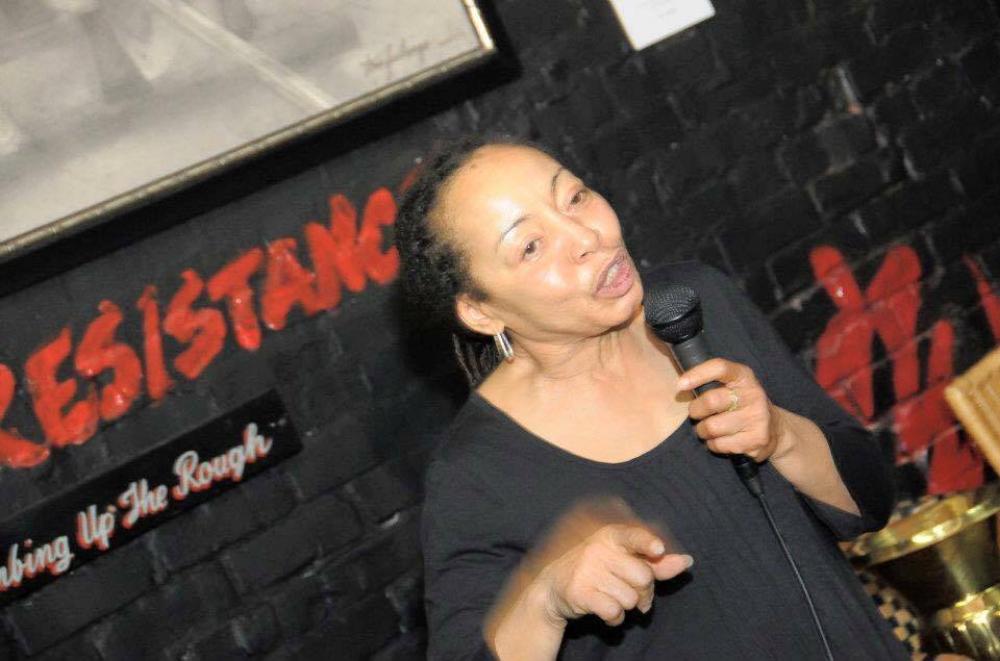Connie Tucker was a Black freedom struggle and an environmental justice (EJ) movement leader. She was also a political prisoner during the Black Power era. One of six siblings, she was born to Otis Spencer, Jr. and Bernice Nall on October 14, 1950, in Seale, Alabama.
Tucker honed her grassroots activist sensibilities at the University of South Florida (USF) in Tampa. She and Askia Muhammad Aquil co-founded the Afro-American Society, organizing activities including a 1969 protest that helped initiate USF’s Afro-American Studies program. In 1970, the colleagues founded Black Youth for Peace and Power (BYPP), an organization dedicated to exposing the drawbacks of school desegregation and protesting the Vietnam War. Tucker’s activism connected her with the Junta of Militant Organizations (JOMO) that same year. Founded by Omali Yeshitela, JOMO was a Pan-Africanist group with the vision of functioning as a central body for the Black freedom struggle. Tucker worked in JOMO’s St. Petersburg office, serving as Florida state chairperson, and staffing the Burning Spear Newspaper.
Due to her activism, Tucker became entangled in the web of federal and local efforts to suppress antiwar and Black freedom struggle activities. Agents from the Federal Bureau of Investigations’ Counterintelligence Program and the Tampa Police Department’s Criminal Intelligence Division (CID) targeted both BYPP and JOMO. Tucker resultingly faced a series of arrests and detainments in 1970. In 1971, a judge sentenced her to five years in the state penitentiary for allegedly possessing a fragment of a marijuana joint, evidence officers never produced in court.
Tucker’s plight as a political prisoner sparked a “Free Connie” campaign, which was undertaken by a broad coalition of activists from JOMO, Southern Conference Education Fund, BYPP, and the Southern Christian Leadership Conference to relatives including her grandfather, C.A. Nall. Tucker’s supporters helped secure her freedom after she served almost a year in prison. She resumed her advocacy on release from prison, advocating for Florida inmates’ rights and playing an instrumental role in JOMO’s development of the African People’s Socialist Party in 1972.
Tucker was a Pan-Africanist with deep southern roots and a regional EJ movement stalwart. She returned to Alabama, where she married Tuskegee student-activist, Saihou Taal following her release from prison. The couple had two daughters, Olimatta and Maiyai. The family lived a bicontinental life beginning in 1979, intermittently residing in Taal’s home country, The Gambia, and in the United States. Tucker worked in The Gambia with the United States Agency for International Development and the University of Wisconsin for almost six years. In the U.S. during the 1980s, she agitated for educational equity and helped steward Selma’s 21st Century Youth Leadership Training Project. She was a leader in the Southern Organizing Committee for Economic and Social Justice, spearheading its groundbreaking 1992 regional conference. She was also on the board of directors of the National Environmental Justice Fund and coordinated the Region IV EJ Task Force. Tucker received a Resourceful Women’s Award for sustainability work and a 1998 Bannerman Fellowship for lifelong activism. She succumbed to lung cancer on September 26, 2015, in Atlanta, Georgia at age 64. Tucker’s family honored her commitment to the global struggle for Black freedom and equality by laying her to rest in Juffureh, The Gambia, home of Kunta Kinteh.

